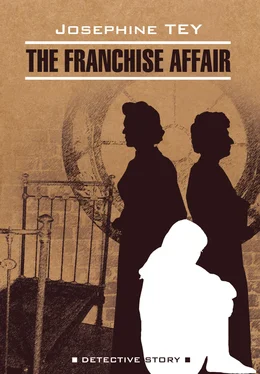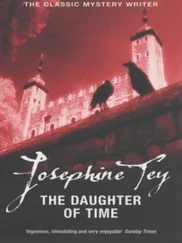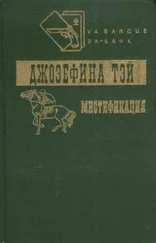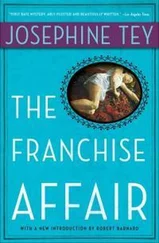“No,” Marion Sharpe said. “The day, according to the Inspector, is the 28th of March. That is a long time ago, and our days here vary very little, if at all. It would be quite impossible for us to remember what we were doing on March the 28th – and most unlikely that anyone would remember for us.”
“Your maid?” Robert suggested. “Servants have ways of marking their domestic life that is often surprising.”
“We have no maid,” she said. “We find it difficult to keep one: The Franchise is so isolated.”
The moment threatened to become awkward and Robert hastened to break it.
“This girl – I don’t know her name, by the way.”
“Elisabeth Kane; known as Betty Kane.”
“Oh, yes; you did tell me. I’m sorry. This girl – may we know something about her? I take it that the police have investigated her before accepting so much of her story. Why guardians and not parents, for instance?”
“She is a war orphan. She was evacuated to the Aylesbury district as a small child. She was an only child, and was billeted with the Wynns, who had a boy four years older. About twelve months later both parents were killed, in the same ‘incident,’ and the Wynns, who had always wanted a daughter and were very fond of the child, were glad to keep her. She looks on them as her parents, since she can hardly remember the real ones.”
“I see. And her record?”
“Excellent. A very quiet girl, by every account. Good at her school work but not brilliant. Has never been in any kind of trouble, in school or out of it. ‘Transparently truthful’ was the phrase her form mistress used about her.”
“When she eventually turned up at her home, after her absence, was there any evidence of the beatings she said she had been given?”
“Oh, yes. Very definitely. The Wynns’ own doctor saw her early next morning, and his statement is that she had been very extensively knocked about. Indeed, some of the bruises were still visible much later when she made her statement to us.”
“No history of epilepsy?”
“No; we considered that very early in the inquiry. I should like to say that the Wynns are very sensible people. They have been greatly distressed, but they have not tried to dramatise the affair, or allowed the girl to be an object of interest or pity. They have taken the affair admirably.”
“And all that remains is for me to take my end of it with the same admirable detachment,” Marion Sharpe said.
“You see my position, Miss Sharpe. The girl not only describes the house in which she says she was detained; she describes the two inhabitants – and describes them very accurately. ‘A thin, elderly woman with soft white hair and no hat, dressed in black; and a much younger woman, thin and tall and dark like a gipsy, with no hat and a bright silk scarf round her neck.’”
“Oh, yes. I can think of no explanation, but I understand your position. And now I think we had better have the girl in, but before we do I should like to say—”
The door opened noiselessly, and old Mrs. Sharpe appeared on the threshold. The short pieces of white hair round her face stood up on end, as her pillow had left them, and she looked more than ever like a sibyl.
She pushed the door to behind her and surveyed the gathering with a malicious interest.
“Hah!” she said, making a sound like the throaty squawk of a hen. “ Three strange men!”
“Let me present them, Mother,” Marion said, as the three got to their feet.
“This is Mr. Blair, of Blair, Hayward, and Bennet – the firm who have that lovely house at the top of the High Street.”
As Robert bowed the old woman fixed him with her seagull’s eye.
“Needs re-tiling,” she said.
It did, but it was not the greeting he had expected.
It comforted him a little that her greeting to Grant was even more unorthodox. Far from being impressed or agitated by the presence of Scotland Yard in her drawing-room of a spring afternoon, she merely said in her dry voice: “You should not be sitting in that chair; you are much too heavy for it.”
When her daughter introduced the local Inspector she cast one glance at him, moved her head an inch, and quite obviously dismissed him from further consideration. This, Hallam, to judge by his expression, found peculiarly shattering.
Grant looked inquiringly at Miss Sharpe.
“I’ll tell her,” she said. “Mother, the Inspector wants us to see a young girl who is waiting in a car outside the gate. She was missing from her home near Aylesbury for a month, and when she turned up again – in a distressed condition – she said that she had been detained by people who wanted to make a servant of her. They kept her locked up when she refused, and beat and starved her. She described the place and the people minutely, and it so happens that you and I fit the description admirably. So does our house. The suggestion is that she was detained up in our attic with the round window.”
“Remarkably interesting,” said the old lady, seating herself with deliberation on an Empire sofa. “What did we beat her with?”
“A dog whip, I understand.”
“Have we got a dog whip?”
“We have one of those ‘lead’ things, I think. They make a whip if necessary. But the point is, the Inspector would like us to meet this girl, so that she can say if we are the people who detained her or not.”
“Have you any objections, Mrs. Sharpe?” Grant asked.
“On the contrary, Inspector. I look forward to the meeting with impatience. It is not every afternoon, I assure you, that I go to my rest a dull old woman and rise a potential monster.”
“Then if you will excuse me, I shall bring—”
Hallam made a motion, offering himself as messenger, but Grant shook his head. It was obvious that he wanted to be present when the girl first saw what was beyond the gate.
As the Inspector went out Marion Sharpe explained Blair’s presence to her mother. “It was extraordinarily kind of him to come at such short notice and so quickly,” she added, and Robert felt again the impact of that bright pale old eye. For his money, old Mrs. Sharpe was quite capable of beating seven different people between breakfast and lunch, any day of the week.
“You have my sympathy, Mr. Blair,” she said, unsympathetically.
“Why, Mrs. Sharpe?”
“I take it that Broadmoor is a little out of your line.”
“Broadmoor!”
“Criminal lunacy.”
“I find it extraordinarily stimulating,” Robert said, refusing to be bullied by her.
This drew a flash of appreciation from her; something that was like the shadow of a smile. Robert had the odd feeling that she suddenly liked him; but if so she was making no verbal confession of it. Her dry voice said tartly: “Yes, I expect the distractions of Milford are scarce and mild. My daughter pursues a piece of gutta-percha round the golf course—”
“It is not gutta-percha any more, Mother,” her daughter put in.
“But at my age Milford does not provide even that distraction. I am reduced to pouring weedkiller on weeds – a legitimate form of sadism on a par with drowning fleas. Do you drown your fleas, Mr. Blair?”
“No, I squash them. But I have a sister who used to pursue them with a cake of soap.”
“Soap?” said Mrs. Sharpe, with genuine interest.
“I understand that she hit them with the soft side and they stuck to it.”
“How very interesting. A technique I have not met before. I must try that next time.”
With his other ear he heard that Marion was being nice to the snubbed Inspector. “You play a very good game, Inspector,” she was saying.
He was conscious of the feeling you get near the end of a dream, when waking is just round the corner, that none of the inconsequence really matters because presently you’ll be back in the real world.
Читать дальше












